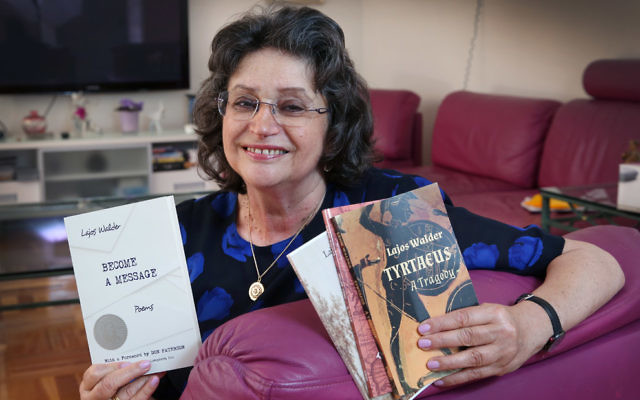Honouring a father’s literary legacy
A lifelong dream has come true for Agnes Walder as her father’s plays – written in Hungary as World War II loomed and hidden from the Nazis – have just been published in America.

FOR 73-year-old Agnes Walder, bringing her father’s poetry and plays to a worldwide audience has been a labour of love for decades, culminating with the publication of his plays by a New York publisher this month.
The publisher, Upper West Side Philosophers, printed four books by Lajos Walder, a Hungarian poet and author who died in the Holocaust – the plays Vase of Pompeii, Below Zero and Tyrtaeus: A Tragedy, and The Complete Plays of Lajos Walder, which is a compilation volume of the three works.
These plays were translated by Agnes after the manuscripts were smuggled out of Hungary in 1961 and brought to Australia.
“I was 18 months old when my father died in the Holocaust, so I never had the privilege of knowing him personally,” says Agnes, who has lived in Sydney since migrating from Hungary with her family in 1957, apart from four years living in the US.
“I’ve long had a major interest in poetry and am a published poet. Alongside my powerful urge to write, I developed an equally powerful urge to rescue his work from oblivion.”
Lajos Walder was born in Budapest in 1913. A brilliant student, he was one of a handful of Jews allowed to enter university. While studying law at university he wrote poetry, edited a literary monthly and published his first book of poems, titled Heads or Tails, under the pseudonym Lajos Vandor.
His second book of poetry, Group Portrait, was published in 1938, the year after he graduated.
With rising anti-Semitism in Hungary, he was prohibited from working as a lawyer and took on a labourer’s job in a factory.
Lajos married Eva Lustig in 1939 and they had three children. After Hungary entered the war as an ally of Germany, Lajos served in a forced labour battalion. It was in 1942-43 that he wrote his three plays in secret.
When the Germans occupied Hungary in March 1944, the deportation of Jews began and in the final weeks of the war Lajos was interned at Gunskirchen.
When American forces liberated Gunskirchen on May 7, 1945, Lajos, who was severely malnourished and suffering from typhus, accepted a tin of meat from them, but immediately developed severe stomach cramps and died within hours.
After World War II the family remained in Hungary until after the 1956 uprising, when Agnes, her siblings, mother and stepfather migrated to Australia.
“In 1961, my grandmother, Ida Walder, was able to follow us,” says Agnes. “The things she could bring with her were severely restricted and closely scrutinised. However, no-one suspected that the bundles of age-old, yellowed and torn manuscripts she packed in her trunk were anything other than the sentimental memorabilia of an old lady. That is how my father’s unpublished manuscripts reached Sydney!
“I spent years sorting out his prolific output of unpublished works. I did this slowly; often needing to stop for a while because it was too painful. By 1987, the manuscripts were in good order.”
The poetry by Lajos was different to traditional Hungarian poems.
“I was concerned that his work would disappear if it was not translated and so I started to do this in 1991 in the hope that it would reach a much bigger world,” says Agnes.
“My father’s modernity, his deliberate break with poetic tradition by writing in free verse, which was frowned upon at the time, made it possible for me to successfully translate him. Hungarian is a very different language from English – it is far more ‘longwinded’. Yet I continued to marvel at the economy of his expressions written seven or eight decades ago.”
In 2004, Macmillan Australia published some of his translated poems in a book focusing on the 1930s.
“After that, I stopped working on the poems and concentrated on the plays,” says Agnes.
In 2007, Macmillan Australia published his three plays in English in the book, The Dramas of Lajos Walder.
Agnes continued to translate her father’s poems and was still hoping for a global audience for his work. This took a major leap forward in 2012 when she sent Dr Michael Eskin, director of publishing at Upper West Side Philosophers in New York, all 100 poems that had been translated into English.
The resultant book, Become a Message: Poems, was published in 2015 by Upper West Side Philosophers and last year won silver at the Independent Book Publishers’ Benjamin Franklin Awards in the poetry category.
And earlier this month Upper West Side Philosophers published the three plays and compilation volume.
In Tyrthaeus: A Tragedy the Nazi reign of terror is set in ancient Sparta; Vase of Pompeii is set in Paris in the 1930s and concerns a life not lived because of the lack of courageous choices; Below Zero is a drama played out between three people at a remote radio outpost in northern Quebec in 1942.
“Now, after all these years, my father’s poetry and plays are out in the English-speaking world,” says Agnes, adding that all of her father’s original manuscripts are held in the archives of Yad Vashem in Jerusalem.
Vase of Pompeii, Below Zero, Tyrthaeus: A Tragedy and The Complete Plays of Lajos Walder are published by Upper West Side Philosophers, New York. www.westside-philosophers.com.
REPORT by Danny Gocs

comments